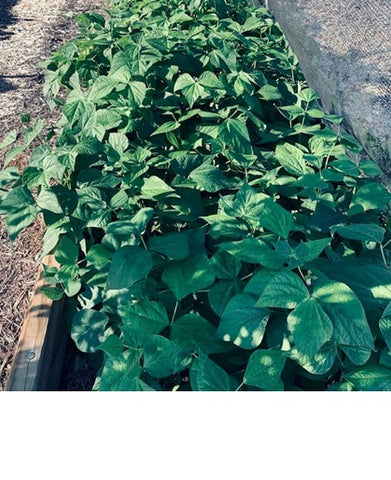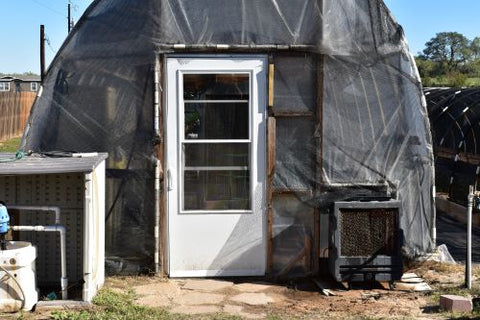Growing a Winter Garden
As the temperature for some places is taking a fast dive, plunging into the 40° Fahrenheit temperatures, and going even lower in other places, you may be thinking that’s the sign that all the gardening fun is over for the year, and that it’s time to hang up the gardening boots and shovel and store the garden seeds, but that doesn’t have to be the case yet. Even with fall being well advanced and winter being right around the corner, you can still be enjoying your garden and reaping the delicious harvest from what you grow! In this article we’re going to be talking about growing a winter garden and what vegetables you can still be planting when the warm air gives way to the cold!
Carrots
Carrots are one of the best-known vegetables to grow in your winter garden! They can tolerate the frost which makes them ideal for many different plant hardiness zones in the fall and winter. Carrots can also be left in the ground over winter. The cold weather can cause them to develop sweeter tasting roots by producing more sugar, thus making carrots a good, tasty fall and winter garden choice!
Beets
Like carrots, beets are another delicious root that can be grown in areas with more mild winters, and they can survive light frosts. In harder frosts they’ll need protection like a covering, but they’ll be hardy all the way down to 30 degrees! Like carrots, beets can be left in the ground over winter in most climates in good free draining soil. The fruit will remain perfectly fine underground even if the tops die back a bit.
Spinach
Spinach is another great tasty and hardy vegetable that can survive freezing temperatures making it an ideal winter garden plant with plenty of nutrients to keep you well-nourished during the cooler seasons. With the right protection your spinach can make it through the winter even in the freezing weather so you can keep growing this plant and reaping the tasty benefits. The good thing about spinach is you can grow baby leaves in about 30 days and pick them before the frost.
Turnips
Turnips are a good, cold-hardy root! They can survive brief freezes under 30 degrees Fahrenheit and the colder winter temperatures can make their flesh taste sweeter. They’ll produce more sugar in the colder weather so leaving them in the ground for a short while during a frost can cause them to be sweeter when you harvest them! Turnip greens, also another delicious portion of the plant, can have some trouble when the temperature reaches as low as 28 degrees, so you’ll want to watch out for that if you’re planning on eating the greens too.

Garlic is a vegetable that you plant in the fall and harvest in the summer. Plant it in the fall so it will have good root development before the first frost. IIt will need to over winter for the best results. Layer it with two inches of mulch before the first frost. Garlic is a relatively easy to grow crop and it doesn’t require much looking after either so it can be the perfect thing to grow for gardeners who are busy over the winter but still want to get their gardening in. Garlic can help stabilize blood sugar, lower blood pressure and cholesterol and can even help to prevent cancer according to research.
Cabbage
Cabbage is another great, tasty, and cold hardy vegetable! It can handle freezes as low as 24 degrees. Some cabbage can even produce far into the winter and with a little protection you can overwinter it. The winter varieties will have smaller heads but still good flavor. You’ll want to plant in the late summer or fall before temperatures get under 40 degrees because the seeds won’t germinate in temperatures colder than 40.
Brussels Sprouts
Like many of the other vegetables on this list, Brussels sprouts will have a sweeter flavor after going through a frost, and they can survive temperatures as far down as 20 degrees for short periods of time. If the temperature gets low enough, you’ll have to provide some protection, but you will end up with much better tasting Brussels sprouts. You’ll want to be sure to harvest them regularly which could be well into the snowy portion of the season because they can be a bit top heavy which can make it easier for the wind to damage the plant. Often, Brussels sprouts will thrive in mild winters.
Broccoli
Broccoli is also a great option for fall and winter planting that is frost tolerant and can thrive in 40 degrees and survive in even colder temperatures. If the cold temperatures are going to be prolonged, you’ll want to provide protection, but it is still a good cold hardy plant that will do well in light frosts as long as they are not too prolonged.
Temperature Controlled Greenhouse

Besides picking good winter hardy vegetables to plant, you can also use a heat-controlled greenhouse to keep up the gardening fun in fall and winter. If you want to save money while trying the greenhouse idea out, you can build it yourself with relative ease and for a relatively low cost. Getting your own components like wood, or PVC pipe, or both can help you put together your greenhouse and give you somewhere to continue planting late into the coldest months, provided, of course, that you have a way to give your plants much needed light on those colder, darker winter days.
A greenhouse can also provide a warm protective place to store the potted plants that you already have growing that might not do so well in the colder winter temperatures. Electric and propane heaters are both great options for keeping your greenhouse warm just as long as you're careful with where you place the heaters and keep an eye out for any flammable material that might catch fire easily if a heater is near it.
The fun doesn't have to be over just because the cold is coming, and with these ideas you can keep the gardening up over winter until it's time to get your spring garden varieties planted to start off the next year of gardening fun, and remember, winter gardening also provides a chance to garden with much less chance of a weed and garden pest invasion!







Leave a comment